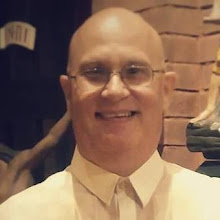On February 22, newEar, Kansas City's foremost (and only) contemporary music ensemble, presented a most interesting, slightly strange and ultimately partly satisfying concert at the Community Christian Church, a venue that can frankly be described in the same manner, A collaboration between newEar and the Bach Aria Soloists ensemble, the highly anticipated concert (a local reviewer called it the best thing since Mr Reese and Mr Hershey combined their wares) was billed from "Bach to Stravinsky" an exploration of the baroque influence on contemporary music. The forces combined to perform the rarely heard complete narrated Stravinsky L'histore du Soldat. The first half was billed, since the beginning of the season, as selected baroque works influencing contemporary music.
For some reason I think something went astray in the execution.
The first half was solely a single work by Bach, the Sonata for Violin and Basso Continuo in E-minor, BWV 1023. Elizabeth Suh Lane (violin), Jeff Harshbarger (bass) and Elisa Williams Bickers (harpsichord) all members of the Bach Aria Soloists gave a fine, committed performance of the work. Sprightly and precise as it should be and slightly on the gritty side as I kind of like my Bach. The harpsichord was all but inaudible, possibly thanks to the acoustics in the hall, yet the bass was nicely integrated with the busy violin.
No one could argue that both Bach and Stravinsky were influential composers, Bach more so after his death. Stravinsky was more influential during his life time. That was part of the connection for sure as was the Stravinsky's very linear writing in his Neoclassical works in general and in L'histore in particular. It would have been more interesting to hear some contemporary composers' transcriptions, orchestrations and arrangements of Bach and other baroque forms, but likely limitations of the ensemble size prevented that.
Whatever the case, we were treated to a fine Bach performance and a thought provoking program.
The evening was all about the Stravinsky really. Performances of the complete L'histore du soldat are likely much more rare than the instrumental suite. In its full form (as Stravinsky noted it is a work "to be read, played, and danced") L' histoire is an engaging, timeless and cynical look at material wealth and selling one's soul to attain it. In this case the work was played and read but with no dancing or acting, just the musical ensemble and the narrator taking both the parts of the Devil and the Soldier. The ensemble was made up of members of the newEar core group, the Bach Aria Soloists members and brass from the University of Missouri-Kansas City. Mark Robbins narrated with William Schrickel conducting the forces.
The ensemble was impeccable, fully capturing Stravinsky's sec, linear and quirkily metered music. Balance (with an ensemble of violin, double bass, clarinet, bassoon, cornet, trombone and percussion not always easy) was excellent, only occasionally swallowing the narrator in the more thickly scored sections. Shrickel kept things moving along in brisk but breathing tempo. Elizabeth Suh Lane, the all important violin, never let her tone get unpleasant but kept the gritty, dry quality Stravinsky wanted. The exposed brass duo were outstanding as were all the members of the septet. The final "Triumphal March of the Devil" was most effectively snarling, arrogant and cynical.
Robbins was a fine narrator and deftly differentiated the soldier's lines from the devil's (often divided between two performers) with inflection of voice, posture and volume. As with the music, he kept things going even when the words were spinning ferociously. The un-credited English translation from the original French was generally faithful to the story. However to me the attempt to modernize C. F. Ramuz's original libretto with references to every current fashion designer known to man (in the scene where Joseph the Soldier starts his meteoric rise to super-salesman on the Home Shopping Network) and current investment and banking language smacked of being more a cheap laugh than anything genuinely funny. Yet these contemporary references served to ground the moralistic tale in our time, making its bitter message more relevant than if it was a distant fairy tale.
I should just quit being analytical (a friend who used to accompany me to concerts before she moved away told me she could see me writing a review in my mind as the concert progressed) and sit back and enjoy the fact that I was able to hear an excellent Bach Sonata and finally experience a live performance of a work I have known and loved since Christ and I were both teenagers.
Sunday, February 23, 2014
Subscribe to:
Post Comments (Atom)



No comments:
Post a Comment